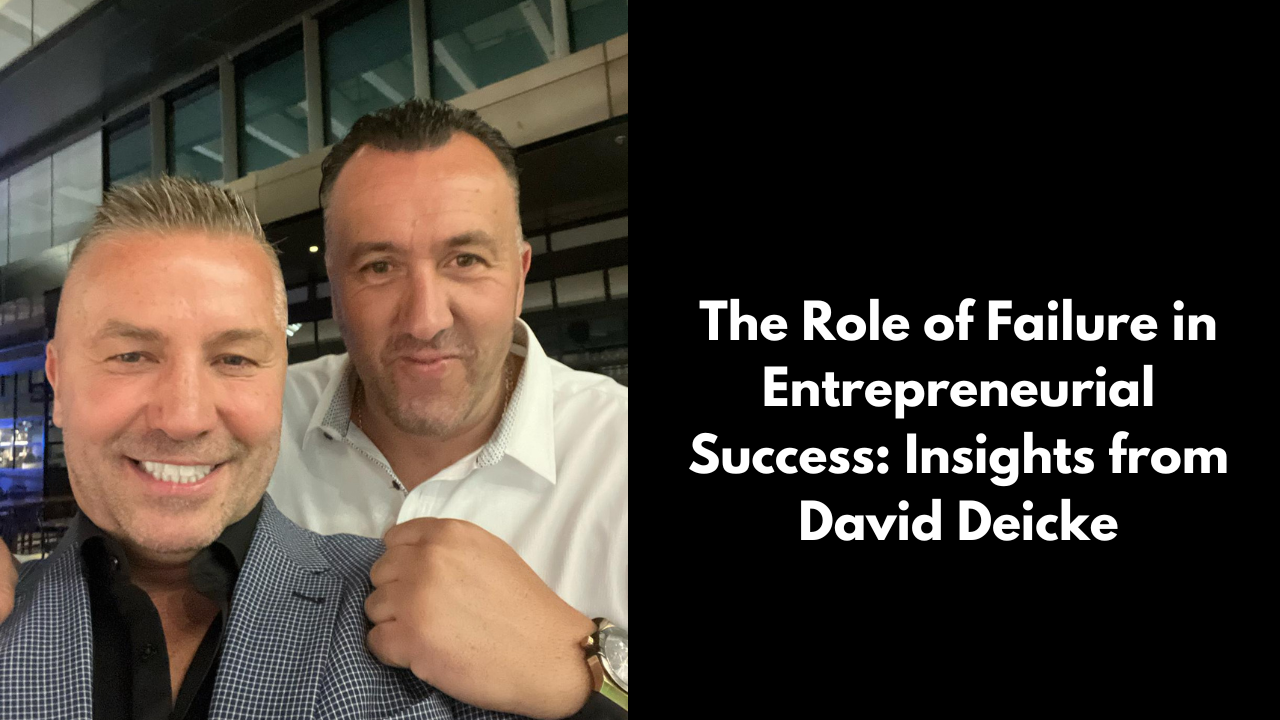In the world of entrepreneurship, failure is often seen as a taboo topic. Many entrepreneurs strive to avoid it at all costs, yet failure is an inevitable part of the journey. David Deicke, a successful Australian businessman and former boxer, understands that failure is not the opposite of success but a crucial stepping stone towards it. This blog explores the role of failure in entrepreneurial success, drawing on insights from David Deicke’s experiences.
Redefining Failure
1. Understanding Failure: Failure is often perceived as a negative outcome, but in the entrepreneurial world, it can be a valuable learning experience. David Deicke believes that failure should be seen as feedback rather than defeat. Each failure provides insights into what works and what doesn’t, helping entrepreneurs refine their strategies.
2. The Stigma of Failure: Society often stigmatizes failure, leading to fear and hesitation among entrepreneurs. David emphasizes the importance of changing this mindset. Embracing failure as a natural part of the entrepreneurial process fosters resilience and innovation.
Lessons Learned from Failure

1. Building Resilience: Failure builds resilience, teaching entrepreneurs to bounce back from setbacks. David’s journey includes several failed ventures, each of which strengthened his determination and adaptability. Resilience is a key trait for entrepreneurs, enabling them to persist through challenges.
2. Encouraging Innovation: Failure often sparks innovation. When traditional approaches don’t work, entrepreneurs are forced to think outside the box. David recalls how a failed business model led him to explore new, innovative strategies that eventually proved successful.
3. Identifying Weaknesses: Failures highlight weaknesses in business plans, strategies, and execution. By analyzing what went wrong, entrepreneurs can address these weaknesses and improve their chances of future success. David regularly reviews his failures to identify areas for improvement and growth.
4. Building Character: The journey through failure shapes an entrepreneur’s character, instilling humility, patience, and perseverance. David believes that his failures have made him a better leader, capable of empathizing with his team and navigating tough times with grace.
Real-Life Examples
1. Early Business Ventures: David’s early business ventures were not always successful. He experienced significant financial losses and faced numerous challenges. However, these failures taught him valuable lessons about market research, customer needs, and financial management, which he applied to his later successes.
2. Transitioning Industries: Transitioning from boxing to the business world was not easy for David. He faced skepticism and initial setbacks, but these experiences helped him understand the importance of adaptability and continuous learning. His willingness to pivot and learn from failures contributed to his eventual success in the business world.
3. Navigating Economic Downturns: Economic downturns have tested David’s businesses multiple times. During these periods, he faced difficult decisions and significant setbacks. However, by learning from these experiences and adapting his strategies, he managed to steer his businesses through tough times and emerge stronger.
Strategies for Embracing Failure

1. Cultivating a Growth Mindset: A growth mindset views failure as an opportunity for learning and growth. Entrepreneurs with this mindset are more likely to take risks and innovate. David encourages aspiring entrepreneurs to embrace a growth mindset, seeing each failure as a step towards success.
2. Conducting Post-Mortems: After a failure, conduct a thorough analysis to understand what went wrong. Identify the factors that contributed to the failure and develop strategies to address them. David regularly conducts post-mortems for failed projects, using the insights gained to improve future endeavors.
3. Seeking Feedback: Feedback from mentors, peers, and customers provides valuable perspectives on failures. Constructive feedback helps entrepreneurs refine their strategies and avoid repeating mistakes. David values the feedback he receives from his network, using it to inform his decisions and strategies.
4. Building a Support Network: A strong support network provides encouragement and advice during tough times. Surround yourself with mentors, peers, and advisors who can offer guidance and support. David attributes much of his resilience to the support he received from his mentors and professional network.
5. Celebrating Small Wins: Celebrate small wins and milestones along the journey. Recognizing progress, no matter how small, boosts morale and motivation. David believes in celebrating the small victories, as they provide momentum and encouragement to keep moving forward.
The Role of Failure in Long-Term Success
1. Developing Resilient Strategies: Failure teaches entrepreneurs to develop resilient strategies that can withstand challenges. By learning from past failures, entrepreneurs can create robust business plans that are adaptable to changing circumstances. David’s businesses are built on resilient strategies that have been refined through past failures.
2. Fostering Innovation and Growth: Embracing failure fosters a culture of innovation and continuous improvement. Businesses that encourage experimentation and learning from failures are more likely to stay ahead of the competition. David’s commitment to innovation and growth has been a driving force behind his success.
3. Building a Stronger Foundation: Each failure strengthens the foundation of an entrepreneur’s knowledge, skills, and experience. This solid foundation is crucial for long-term success. David’s journey is a testament to how failures can build a stronger, more capable entrepreneur.
Conclusion
Failure is an integral part of the entrepreneurial journey. Embracing failure and learning from it leads to resilience, innovation, and long-term success. David Deicke’s experiences highlight the importance of viewing failure as a stepping stone rather than a setback.
Entrepreneurs should cultivate a growth mindset, conduct post-mortems, seek feedback, build a support network, and celebrate small wins to navigate and learn from failures effectively. By doing so, they can build resilient businesses that thrive in the face of challenges and seize opportunities for growth.
In the words of David Deicke, “Failure is not the end; it’s the beginning of a new chapter filled with opportunities for growth and success.” Embrace failure, learn from it, and let it guide you on your entrepreneurial journey towards long-term success.

